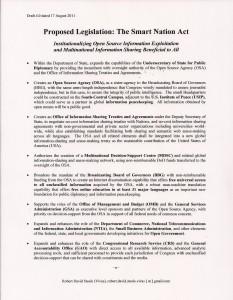
Phi Beta Iota: Mr. Johnson is the author of Integrity at Scale, free online, whose many ideas are being integrated into the vision for a Smart Nation Act and the hub of the Smart Nation, an Open Source Agency and global Multinational, Multiagency, Multidisciplinary, Multidomain Information-Sharing and Sense-Making (M4IS2) network of networks. He is a party to the on-going push to establish the Open Source Agency and create a more competent and ethical America.
– – – – – – -BEGIN REFLECTIONS- – – – – – –
As I look at the Open Source idea, I find myself experiencing a fair amount of dissonance between a methodological vision of open source intelligence, at one level, and at a very different level, an aspirational vision that sees it as a way of disinfecting a misguided and corrupt set of bureaucracies.
One mission is potentially endorsable by the powers-that-be. The second mission is not. Ask people to endorse both and it isn’t likely that either will move forward. If corruption prevention is to be the mission, the open source agency will have to find a home outside of government. If transparency of intelligence is the mission, then perhaps it can find a home inside government.
My second source of dissonance has to do with design and scale. Open source intelligence is potentially as vast as all the server farms Google will ever own. How does a relatively modest site, squeezed in between State and Watergate, ever acquire the heft to handle the challenge? The scope of the mission and the scope of the agency seem out of sync with the scope of the real estate footprint.
Continue reading “Steven Howard Johnson: Reflections on OSINT”






